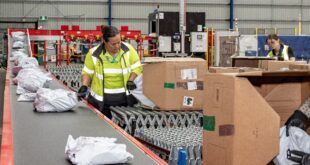Tesco sets sights on Ocado by offering its store pick technology to international grocery businesses
Transcend Retail Solutions, a Tesco subsidiary led by its Strategy Director Oliver Vogt, is providing the UK supermarket giant’s software and hardware to international grocers, leveraging its vast experience in this space to enable them to fulfil online orders from their own stores.
According to The Sunday Times, a first deal has been signed with New Zealand’s biggest grocery retailer, Foodstuffs North Island, and talks are being held with other companies.
Tesco currently handles more than a million online orders a week, 85% of which are picked from its supermarkets.
“Our solutions are tried and tested,” Vogt told The Sunday Times. “We set up Transcend because we truly believe we have something to offer the market.”
Foodstuffs is tapping Tesco’s cloud-based picking software, which receives online orders and then maps, on handheld devices, the most efficient route for staff to pick the items from supermarket shelves.
The technology is live in two stores, operating under the PAK’nSAVE and New World brands, and plans are afoot to expand the roll-out across 150 locations. Transcend will also be able to deploy micro fulfilment centres inside retailers’ stores.
Carrot tapped by Legal and General real estate investment portfolio for waste management project
Legal & General’s (L&G’s) real estate investment portfolio has appointed Carrot, a Norwegian software provider specialising in occupier level waste management solutions.
Carrot’s software will be utilised across applicable properties within L&G’s UK investment real estate portfolio, which includes offices, industrial estates, retail parks, shopping centres, and large residential developments.
L&G’s work with the company will involve a phased roll-out of the technology across multi-let offices, industrial estates, shopping centres, and build-to-rent developments.
Carrot will also be integrated into Vizta, L&G’s digital platform for businesses which gives access to real-time property management and sustainability data. Vizta is aimed at the people or teams responsible for managing leased property within occupier organisations and covers over 4,000 leases and 700 properties within L&G’s investment portfolio.
Starbucks offers free coffee on Roblox platform as Dubit opens doors to virtual stores in role playing games
Dubit has opened Starbucks’ first four virtual stores in some of the most popular Roblox role playing games.
These are available to Roblox fans from 13 markets across Asia Pacific.
The virtual stores are inspired by physical locations and set across virtual cities on Roblox like Bilberry City, Theme Park HeideLand, Seaboard City, and NewSmith. People can order a beverage from green apron partners, chat with fellow users, and embark on a treasure hunt.
They will journey through a map to search for ten coffee inspired collectible items, unlocking exclusive in-game rewards along the way. In-game achievements can be redeemed for real-world rewards at select Starbucks stores across eight markets, including Cambodia, Laos, Hong Kong & Macau, Indonesia, Malaysia, New Zealand, Singapore and Thailand.
“Come visit and enjoy a virtual coffee in our virtual third place. There are 35,000 UGC items up for grabs, and even more real-world prizes courtesy of Starbucks from free customisations to free coffees,” says Matthew Warneford, CEO at Dubit, which has created Gamer Rewards, pitched as the first loyalty programme for Roblox that lets players earn in-game rewards and redeem them off-platform, and also Gamer Retail to power immersive in-game retail experiences for brands.
Warneford adds: “I’m hugely excited. This year we’ve seen meaningful real-world outcomes from Roblox. Last month, we drove 15,000 people into real-world stores here in the UK.”
“Earlier this year, we delivered a 22% increase in sales velocity for one of America’s most popular lunchtime snacks. Roblox drives real-world results, and will for Starbucks too.”
“The campaign is geo-locked to APAC regions. Thanks Starbucks! And a big thank you to our amazing game partners: Seaboard City, Bilberry City, New Smith, and Theme Park HeideLand.”
Currys CITO Andy Gamble: retailers’ addiction to data is killing the magic of human intuition and originality
As retailers become increasingly data driven, they risk losing the very thing that makes them stand out or relevant: their creativity. So says Andy Gamble, Chief Information & Transformation Officer (CITO) at Currys.
In an online post, he says: “With the rise of Big Data, AI, and machine learning, retailers have gained unprecedented access to insights about customer behaviour, preferences, and purchasing patterns.”
“While these tools have certainly revolutionised the industry, many retailers are now facing an unintended consequence: an over-reliance on data and algorithms is stifling creativity, leading to homogenised experiences that lack the magic of human intuition and originality.”
From personalised product recommendations to supply chain optimisation, data has become an essential tool for driving efficiency, predicting trends, and meeting customer expectations.
Gamble comments: “We use it extensively in our day jobs across my team at Currys. Customers leave a digital trail that retailers like us are eager to follow, using everything from purchase history and website behaviour to location data and social media activity to tailor our offers and ensure a more personalised experience.”
“The promise of data is compelling: right product, right customer, right time. It benefits all and is a formula that, in theory, should drive higher sales and customer satisfaction. And, in many ways, it has. Retailers that master data analytics often report higher conversion rates, improved inventory management, and better-targeted marketing efforts.”
Creativity, however, is being sidelined. The problem is that algorithms and data models, while efficient, are inherently backward looking, Gamble argues.
Source link



